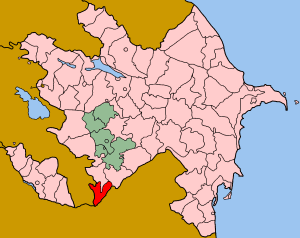| UN Security Council Resolution 65 | |
|---|---|
| Date | December 28 1948 |
| Meeting no. | 395 |
| Code | S/1165 (Document) |
| Subject | The Indonesian Question |
Voting summary | 9 voted for None voted against 2 abstained |
| Result | Adopted |
| Security Council composition | |
Permanent members | |
Non-permanent members | |
United Nations Security Council Resolution 65, adopted on December 28, 1948, requested that the consular representatives in Batavia referred to in United Nations Security Council Resolution 30 send a complete report on the situation in the Republic of Indonesia, covering the observance of ceasefire orders and the conditions prevailing in areas under military occupation or from which armed forces now in occupation may be withdrawn.

The United Nations (UN) is an intergovernmental organization that was tasked to maintain international peace and security, develop friendly relations among nations, achieve international co-operation and be a centre for harmonizing the actions of nations. The headquarters of the UN is in Manhattan, New York City, and is subject to extraterritoriality. Further main offices are situated in Geneva, Nairobi, and Vienna. The organization is financed by assessed and voluntary contributions from its member states. Its objectives include maintaining international peace and security, protecting human rights, delivering humanitarian aid, promoting sustainable development and upholding international law. The UN is the largest, most familiar, most internationally represented and most powerful intergovernmental organization in the world. In 24 October 1945, at the end of World War II, the organization was established with the aim of preventing future wars. At its founding, the UN had 51 member states; there are now 193. The UN is the successor of the ineffective League of Nations.

Jakarta, officially the Special Capital Region of Jakarta, is the capital and largest city of Indonesia. Located on the northwest coast of the world's most populous island, Java, it is the centre of economics, culture and politics of Indonesia, with a population of 10,075,310 as of 2014. Jakarta metropolitan area has an area of 6,392 square kilometers, which is known as Jabodetabek. It is the world's second largest urban agglomeration with a population of 30,214,303 as of 2010. Jakarta is predicted to reach 35.6 million people by 2030 to become the world's biggest megacity. Jakarta's business opportunities, as well as its potential to offer a higher standard of living, attract migrants from across the Indonesian archipelago, combining many communities and cultures.
United Nations Security Council Resolution 30, adopted on August 25, 1947, upon having learning of the desire of both the Netherlands and Indonesian Nationalists in the Indonesian National Revolution to comply with United Nations Security Council Resolution 27, the Council requested that each of its members recall a diplomatic officer from Batavia to instruct them on the situation.
The resolution was adopted with nine votes to none; the Ukrainian SSR and Soviet Union abstained.

The Soviet Union, officially the Union of Soviet Socialist Republics (USSR), was a socialist state in Eurasia that existed from 30 December 1922 to 26 December 1991. Nominally a union of multiple national Soviet republics, its government and economy were highly centralized. The country was a one-party state, governed by the Communist Party with Moscow as its capital in its largest republic, the Russian Soviet Federative Socialist Republic. Other major urban centres were Leningrad, Kiev, Minsk, Alma-Ata, and Novosibirsk. It spanned over 10,000 kilometres east to west across 11 time zones, and over 7,200 kilometres north to south. It had five climate zones: tundra, taiga, steppes, desert and mountains.













